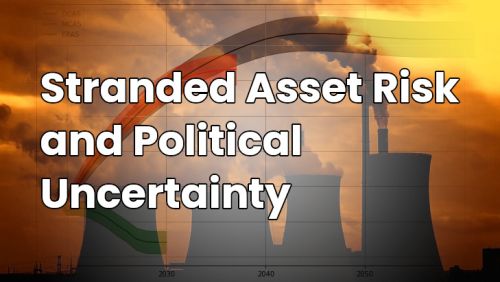
Webinar: Stranded Asset Risk and Political Uncertainty
Written on 24 May 2023.

The energy industry plays a crucial role in mitigating climate change. However, transitioning from a carbon-intensive to a net-zero economy cannot be solely the responsibility of the industry. It requires sound policies and adequate financial support to be successful. The industry faces uncertainty in climate policies, which poses one of the biggest threats as sudden changes can lead to stranded investments. This uncertainty also increases the cost of financing new green technologies and makes the transition less economically attractive. Moreover, the risk of stranded assets can spill over to the financial sector, endangering the economy's financial stability. The cost and benefits of the energy transition will be borne by society as a whole, and unfortunately, the cost may be realized by the most vulnerable groups sooner. While the transition will eventually benefit mankind, the necessary costs threaten the way of life for many people today. Policymakers must make sound decisions for climate and energy policy, considering the complex relationship between the dimensions of the transition.
The aim of this webinar, organised by IAEE (International Association for Energy Economics), is to provide an overview of the energy transition's dimensions and its consequences. It will discuss the topic from an energy economic, societal, policy, and financial perspective, with a focus on how these levels interact with each other. The panelists will provide opening statements on their research, followed by a panel discussion on stakeholder actions to avoid an unorderly transition that may result in economic and societal costs.
On June 7 at 4:00pm CET, Irene Monasterolo, Professor of Climate Finance, EDHEC Business School, Programme Director (Impact of Finance on Climate Change Mitigation and Adaptation), EDHEC Risk Climate Impact Institute, will discuss insights from her last voxEU paper "Climate regulation and financial risk: The challenge of policy uncertainty". The column, co-written with Tobias Berg, Elena Carletti, Stijn Claessens, Jan-Pieter Krahnen and Marco Pagano, argues that it would be welfare-enhancing if policy changes were to follow a predictable longer-term path. Accordingly, the authors suggest a role for financial regulation in the transition.
Other panelists include:
- Aya Kachi, Associate Professor for International Political Economy and Energy Policy, University of Basel (Switzerland)
- Pao-Yu Oei, full Professor for "Economics of Sustainable Energy Transition", Europa Universität Flensburg (EUF), directing the study program "Industrial Engineering: Energy and Environmental Management", and Head of the 30-member research group "FossilExit", EUF, TU Berlin and DIW Berlin
- Thomas Walther, tenured Assistant Professor of Finance, Utrecht School of Economics, Utrecht University

